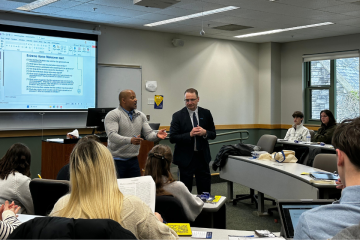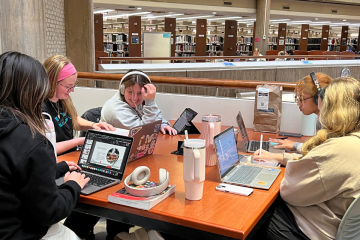Breaking Down Silos to Protect the Environment

The health and well-being of the environment, and the quest for a sustainable future, are some of the most significant challenges facing society today.
Now, more than ever, the public and private sector is examining how its practices affect climate change, pollution, energy consumption, and the ever-increasing consumer pressure to do better.
Protecting the environment has spurred organizations to create a host of new jobs or transform existing ones. The Bureau of Labor Statistics projects that environmental scientist and specialist jobs will grow 8 percent by 2030.
Sustainability spans sectors – from science to management to policymaking – making the related career opportunities vast and essential.
To prepare students to live, work, and lead in the green economy, Widener University has adopted an interdisciplinary approach via existing programs – including the Master in Public Administration (MPA) – and by developing new academic majors in green chemistry, and environmental health and sustainability management.
Sustainability needs to run across sectors – just like diversity, equity, and inclusion – and touch all aspects of an organization. The right answer can’t be one department. Everyone needs to be aware of how their field fits. — Jim Vike, professor and MPA program director
Green Chemistry
Educating students about eco-friendly scientific practices has long been part of Widener’s traditional chemistry curriculum.
The new green chemistry major, which sits alongside chemistry, offers a “broader perspective to the degree and a broader picture of sustainability,” with interdisciplinary courses, said Associate Dean of Sciences Loyd Bastin, who developed the program.
Widener’s green chemistry program is the first undergraduate major of its kind on the East Coast, and one of just a few nationwide.
Under green chemistry principles, chemists seek to create processes and products that are less hazardous and wasteful, and more energy efficient.
We’re preparing chemists to go into the chemical industry with this changed mindset in place. We want to infuse the chemical workforce with people who are passionate about sustainability and understand the challenges and have the tools to address it. Green chemistry is chemistry done the right way. — Loyd Bastin, associate dean of sciences
Green chemistry was not on junior Andrew Devany’s radar until taking Bastin’s organic chemistry class.
“Now I’m calculating green metrics and looking at how wasteful I’m being,” said Devany. “Green chemistry is always something that’s going to be with me now, especially with the literal climate we’re in. I will have to be aware of it, and so will anyone who’s coming into the field.”
Devany works alongside Bastin and Sebastian Cuka ’22 to research more environmentally-friendly ways to synthesize compounds that can be used in pharmaceuticals, potentially in the treatment of Alzheimer’s disease.
Through his research and studies, Cuka, a chemistry and chemical engineering major, has been inspired to seek post-graduation work with companies that engage in green practices. “I want to use what I learned in class and make a positive change,” he said.
Science Meets Business
The new environmental health and sustainability management major brings science and business together, offering students the agility to pursue careers ranging from managing teams to performing scientific experiments. The program is designed to break down silos and equip students with the language and expertise needed to move effectively in both worlds.
Itzick Vatnick, professor of biology, biochemistry, and environmental science and sustainability, helped develop the new major. He believes “scientists have to have management skills to instigate systemic change.”
The same is true for those on the business side, said management Professor Brian Larson, who also collaborated on the program’s development.
“In a free market economy, you need to work from the inside,” said Larson.
Environmental considerations are top of mind for marketing and management major Donovan Green ’22. This semester, he’s taking Larson’s marketing research course, which is working with the Philadelphia Eagles to gauge how the football franchise’s sustainability efforts impact their fans.
Green is specifically focusing on Generation Z fans, his generation. Studies have shown that Gen Z’ers are more likely to name the environment as one of their top concerns, participate in environmental advocacy, and engage with, and buy from, eco-friendly brands.
A self-described car lover with a Mad Men obsession, Green is eying a career in automotive marketing. Environmental issues are at the forefront of that industry as car companies face mandates to reduce emissions and switch to electric-only or other alternative energy-powered vehicles in the coming years.
Taking classes that combine business and sustainability is putting Green in the driver’s seat of his future.
Going into this year, I was definitely aware of the environment and sustainability, but this year really hammered it home. If you’re not thinking about sustainability now, you will be soon. — Donovan Green '22, marketing and management major
Green is also taking Jeremy Hancher’s class, Sustainability Innovation and Entrepreneurship. The course brings together business and engineering students to explore climate change and environmental justice, often through case studies of companies ranging from Volkswagen to Hershey to Facebook.
“The goal is to get their minds open. When our students enter the workforce, they may not directly manage an environmental program, but what they do will have an overall effect on environmental well-being,” said Hancher, program manager of the Environmental Management Assistance Program (EMAP) in Widener’s Small Business Development Center, which helps small businesses navigate environmental regulations.
Greener Public Policy
Hancher is also a guest speaker in Vike’s course, Sustainability Issues in Public Administration, an MPA elective.
Vike draws faculty guest speakers from across Widener – from biology to sociology to history – to explore sustainability issues at the individual, community, government, and nonprofit levels.
MPA student Aaron Campbell takes these interdisciplinary perspectives and applies their lessons in real-time to his work as a township zoning officer.
“I’m always taking something away from these people to learn and use toward my job,” said Campbell, who’s township is tackling policies to mitigate the negative impact of development, promote wind and solar power, and protect waterways.
Trying to balance environmental concerns with the needs and desires of residents and businesses is no easy task, and for Campbell, Vike’s class has reinforced the importance of communicating with and educating constituents.
“The concept is not just sustainable but thriving communities,” said Campbell.



